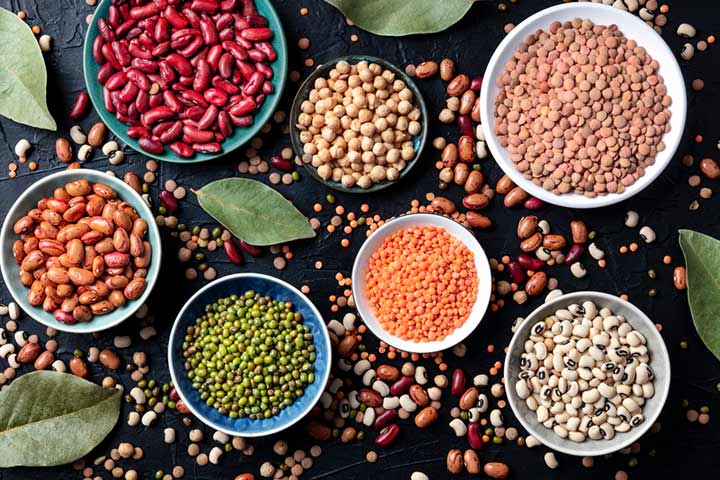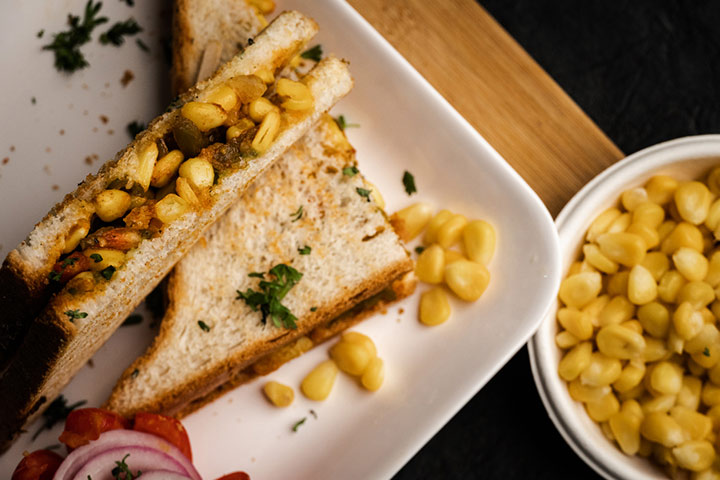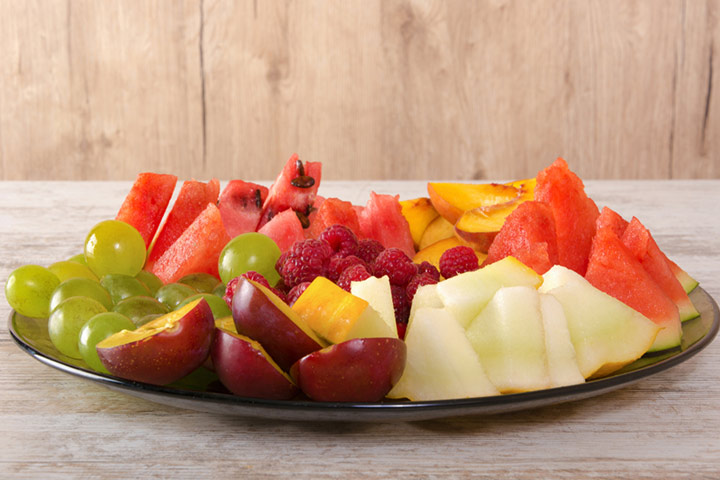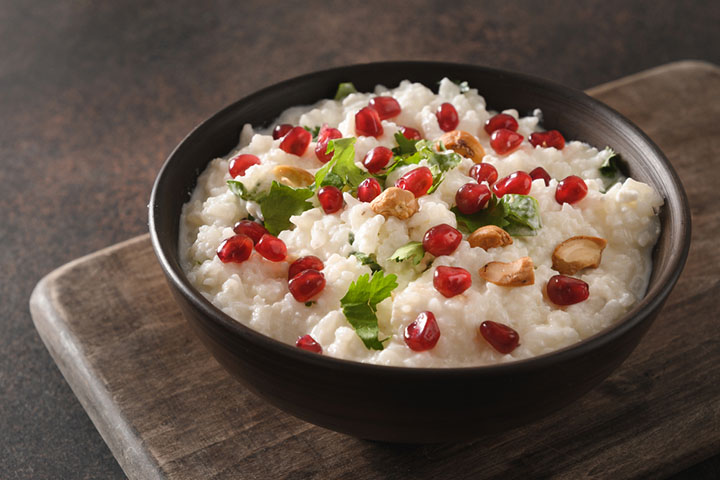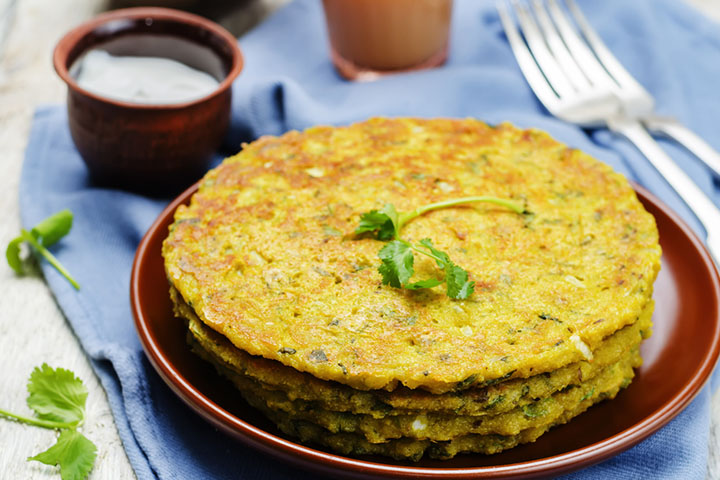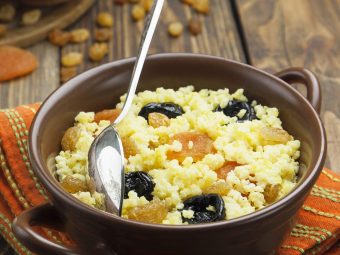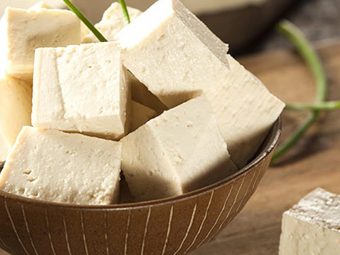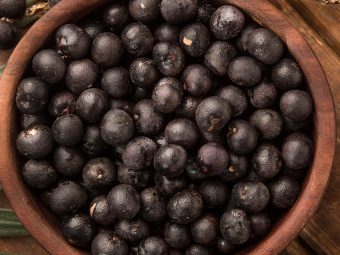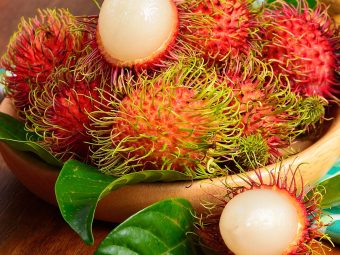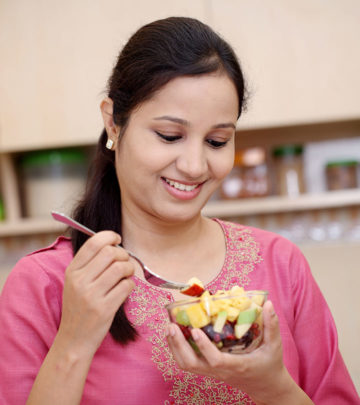
Image: ShutterStock
Pregnancy requires all the nutrients for a complication-free journey of conception and a healthy baby. Following an Indian diet during pregnancy makes for a balanced and healthy choice of meals, whether you are a vegetarian or a non-vegetarian. A balanced diet should ideally include food from all the major food groups, namely, proteins, carbohydrates, fats, minerals, vitamins, and water.
An Indian food plan involving pulses, dairy, meat, fruits, vegetables, and liquids ensures that you get all the required nutrient-rich foods. So if you are pregnant and tons of advice from people about ideal pregnancy food is making you confused between what to eat and what not to eat, then read on. This post will help you understand the Indian diet you may want to try during pregnancy.
The Right Indian Diet During Pregnancy
Once you are pregnant, it is rather important that you eat the right type of foods and in the right quantities. No one food group can provide your unborn baby and you with the nutrition that you need during these months. If you have been eating well till now, you are most likely on the right path already. However, if your diet was poor till now, or you were not including all nutrition groups in your everyday diet, you will have to make some changes.
An Indian diet for pregnancy is rich in all the nutritional requirements that both you and your baby need during the pregnancy months. It will help you with the right amount of weight gain and provide your body the energy it needs to help support your baby and keep you healthy, fit, and in good shape for the delivery.
The graph here depicts the usual trends in dietary intake of Indian pregnant women based on the data collected by the National Family Health Surveys in the years 2005-2006 and 2015-2016. While the consumption of pulses and vegetables decreased in 2016 vis-a-vis 2006, that of dairy and fruits increased. Meat consumption continued to be the least.
Dietary intake among pregnant women in India
Source: Nguyen, P.H.; Kachwaha, S.; Tran, L.M.; Sanghvi, T.; Ghosh, S.; Kulkarni, B.; Beesabathuni, K.; Menon, P.; Sethi, V. Maternal Diets in India: Gaps, Barriers, and Opportunities. Nutrients 2021, 13, 3534.Indian Food Sources For A Healthy Pregnancy
Aarthi, a mother of two girls, shares her insight into the foods she indulged in while maintaining a healthy diet. She says, “When I was pregnant, I craved a bowl of curd rice with mango pickle, jamun fruits, and bounty chocolate bars. I ate tons of them. But I tried to eat a balanced diet often. I included many fruits, veggies, and nuts in my diet (i).”
While you are looking for Indian food during pregnancy, here are a few key food groups that you should aim to include in your everyday diet plan:
1. Milk And Other Milk Products:
Include foods such as whole milk or skimmed milk, yogurt, buttermilk, cheese, cottage cheese (paneer). All these are protein and calcium-rich foods and good sources of vitamin B12.
2. Pulses, Dals, Cereals, Nuts And Whole Grains:
Image: Shutterstock
If you are not a meat eater, include pulses, dals, cereals, nuts, and whole grains in your everyday diet to make up for your body’s protein requirement. If you follow a vegetarian diet, you may need about 45 gm of nuts each day and about a two-thirds cup of pulses daily.
3. Fruits And Vegetables:
Include lots of fresh fruits and vegetables in your everyday diet as it will help you gain your body’s required amount of fiber, vitamins and minerals. Make sure you have about five servings of each on a daily basis.
4. Fish, Meat, And Poultry:
If you eat meat and fish, include them in your regular diet; these protein-rich food sources will provide your body with the required amount of concentrated proteins.
5. Liquids:
While you are pregnant, you will need additional liquids to make sure that you are hydrated all the time. Drink as much water and liquids as possible throughout the day to maintain proper hydration. You can simply have clean and filtered water throughout the day, or sip on infused water with fresh fruits. Avoid going for packaged juices as they are very high in their sweet content.
 Quick tip
Quick tip6. Fats:
Image: IStock
Eating fats will help your body get the energy it needs to help you support the development of your growing baby as well as prepare your body for delivery. Vegetable oil can be a source of fat and, depending on the type, could contain unsaturated fats. Butter and ghee (clarified butter) contain a lot of saturated fats, and hence you should have them in small amounts only.
How To Spread Out Your Diet Through The Day
To make sure that what you eat helps your body and also helps you stay interested, spread out your food throughout the day by following different food ideas. This way, you can also manage food cravings, if any.
While you are pregnant, it is vital to make sure that you first check about anything that you eat or drink with your doctor. Even though the suggested foods are considered healthy, your doctor will be the best person to assess your maternal health and give you the go-ahead. Once you have a confirmation, here is how you can spread out the meal plan through the day:
1. Pre-Breakfast Snack:
- A glass of plain cow’s milk
- Almond milk
- Milkshake
- Tomato juice
- Dry fruits
 Quick tip
Quick tip2. Breakfast:
Image: Shutterstock
- Bowl of fruits
- Wheat rava upma with lots of vegetables
- Poha with lots of vegetables
- Oats porridge
- Whole wheat toast with butter and omelet
- Vegetable omelet
- Paranthas with fillings of spinach, dal, potatoes, carrots, beans, cottage cheese, cheese with curd
- Mixed bean cutlet or patties
- Some fruits to go along with the breakfast such as apricots, dates, sweet fig, banana, oranges
- Cheese toast or cheese and vegetable sandwich
- Vegetable handvo
- Rice sevai with lots of vegetables
3. Mid-Morning Snack:
- Tomato soup
- Creamy spinach soup
- Carrot and beet soup
- Chicken soup
4. Lunch:
- Roti with choice of dal, vegetable and a bowl of curd
- Parantha with dal and a bowl of curd
- Carrot and peas parantha with a bowl of curd and some butter
- Jeera or pea rice with raita
- Rice, dal and vegetable with vegetable salad
- Lemon rice with peas and some vegetable salad
- Vegetable khichdi
- Chicken salad with lots of fresh vegetables or vegetable soup
- Chicken curry with rice
- Grilled chicken with a bowl of curd
- Rice, dal, mint raita and a fruit
- Kofta curry with rice
- Cottage cheese parantha with butter and vegetable salad
- Curd rice
- Parantha with sprouted beans salad
5. Evening Snack:
Image: IStock
- Cheese and corn sandwich
- Vegetable idli
- Spinach and tomato idli
- Sevaiya with lots of vegetables
- Carrot or lauki halwa
- Fruit smoothie with fresh fruits such as banana or strawberry
- Roasted peanut mixture with vegetables
- Cauliflower and peas samosa
- Bread cutlet
- Chicken cutlet
- Chicken sandwich
- Chicken soup
- A bowl of dried dates or dry fruits
- A cup of green tea
- Milk porridge with oats, sevaior daliya
- Vegetable daliya
- Mixed vegetable uttapam
6. Dinner:
- Rice with dal, spinach vegetable, and some green salad
- Roti with a bowl of dal, a vegetable of choice and a glass of buttermilk
- Mixed dal khichdi with a vegetable curry and a bowl of curd
- Vegetable pulaoor chicken rice with a bowl of yogurt
- Plain parantha with a glass of buttermilk
Is It Important To Add Any Supplements To Your Indian Pregnancy Diet?
Your doctor will tell you whether or not you need to add any supplements to your diet while you are pregnant. Here are a few conditions in which your doctor may feel you would need a supplement, so make sure that you discuss it with your doctor:
- If you are too nauseous, it can be difficult for you to eat correctly, especially in the first trimester when you might be experiencing morning sickness. Your doctor may suggest that you go for a mineral and vitamin supplement along with your regular food, as it will help to give you the minerals and vitamins that are important during pregnancy.
- If you are a vegetarian or follow any other dietary restrictions due to religious or other reasons, you may be at the risk of contracting some nutritional deficiency. Speak to your doctor about the same to see if you need some supplements.
- One supplement that you will be asked to take while you are pregnant is folic acid. Taking a folic acid supplement while you are pregnant will help prevent various birth defects in your unborn baby, especially neural tube birth defects such as spina bifida. Your doctor will most likely prescribe you a folic acid supplement only after you are 12 weeks pregnant.
- In addition to folic acid supplements, your doctor will also prescribe you some iron supplements and may suggest consuming more iron-rich foods. Taking an iron supplement will make sure that your body gets the right amount of blood, and you are not deficient in your energy levels. Your doctor will regularly check your iron levels at each appointment to check the dosage of iron supplements that you need.
 Did you know?
Did you know?- Your doctor may also advise you about supplements depending on your medical condition, such as if you are suffering from diabetes, have anemia or have a history of pregnancy complications from earlier pregnancies.
A Few Tips To Remember While Eating During Your Pregnancy
Keeping a check on what you eat while you are pregnant is as important as understanding how you should eat it. Here are a few tips that will be of help, especially while you are pregnant:
- No matter what you want to eat, ensure you consult your doctor first. Something that is healthy for someone else who is pregnant may not be as safe or healthy for you. Your doctor will assess your medical condition and advise you accordingly.
- If you feel uncomfortable after eating something, or notice any rashes or redness on your face or skin, make a note of what you ate and keep it with you. Avoid eating it again and speak to your doctor about it.
- Do not give up on oil, ghee or butter for the fear of gaining excess weight. A little amount of fat is important for both you and your baby and you should have some each day while you are pregnant. If you are overweight, speak to your doctor about how much fat you can safely include in your diet.
- Make sure to have some amount of dry fruits in your everyday diet.
- Use salt in moderation, as having too much salt will make your body retain more water, which can further increase your swelling while you are pregnant.
- Add fruits to your everyday diet as your body will need the natural sugars that are present in fruits. Avoid eating too much sugar otherwise.
Image: IStock
- Try to eat at home as much as possible and have fresh homemade food to avoid the risk of infection and prioritize food safety.
- Avoid eating pre-packaged heat-and-eat meals as these are heavily processed and are not a good food choice while you are pregnant.
- If you are buying a ready to eat a meal from outside, make sure to read the instructions on the package and also read the best before date so that you can eat it before the mentioned date.
- If you are buying a ready to eat meal from outside, make sure to read the instructions on the package and also read the best before date so that you can eat it before the mentioned date.
- If you are going to eat outside, check the ingredients that will be used in whatever meal you are ordering. It will help you identify food items that you are allergic to or that your doctor has asked you to avoid eating while you are pregnant.
- Make sure that while you are eating out, you choose a clean and hygienic place and have food there before. If you want to eat out at a new place, avoid ordering anything you have never eaten, especially if you are unsure about their kitchen and overall food quality.
- You may inform the chef that you are pregnant so they are equally wary of what they are making. You can also speak to the chef in person to learn about the ingredients used.
- Wash your hands properly before chopping and cooking, as you can always have the risk of getting sick if your hands are not clean.
- Eat something every time you feel hungry. While you are pregnant, you will tend to feel nauseous and may not want to eat at all. Have adequate fluids if you have vomited since it may increase the risk of dehydration. Keep replenishing your body with liquids such as soups, fresh fruit juices, or milkshakes.
- To avoid feeling bloated or too full and avoid any nausea attacks, space out your meals to six or seven meal times in the day. Keep the food portions to small portions at each meal time instead of having very big ones.
- Do not try to cut down on food while pregnant unless directed by your doctor. Eating right and including the right balance of nutrients in your daily diet while pregnant will help you reduce the baby fat later with much ease.
Indian Recipes for Pregnancy
Find below the two very popular Indian recipes designed to support a healthy pregnancy. These dishes incorporate traditional flavors while ensuring a balanced and nourishing diet for expectant mothers.
1. Curd rice
Image: Shutterstock
You will need:
- 1 cup curd (at room temperature)
- 1/2 cup regular cooked rice
- 1/2 chopped cucumber (optional)
- Split green grapes (optional)
- 2tbsp pomegranate seeds (optional)
- 1tbs broken cashews (optional)
- 1tsp black mustard seeds
- 1 green chili, chopped
- 1 to 2 whole dried red chili
- 5-6 curry leaves
- 1/2tsp Bengal gram (optional)
- 1/2tsp black gram (urad dal)
- Asafoetida (a pinch)
- 1tbsp oil
- Salt to taste
How to make:
- Mix rice with curd, salt, and chopped cucumber (or grapes) and set aside.
- In a small pan, heat oil and add mustard seeds. Add the lentils, red chilies, and a pinch of asafoetida when they splutter.
- Once they turn light brown, add green chilies and curry leaves. Remove from heat and immediately pour the tempering over the mixed curd rice. Cover with a lid to let it infuse.
- Serve fresh, garnished with fried cashews or pomegranate.
2. Moong Dal Cheela
Image: Shutterstock
You will need:
- 2 cups split green gram
- 1/4 cup gram flour
- Fresh coriander leaves (chopped)
- 1tsp cumin
- 1tsp green chilies (finely chopped )
- 1tsp dried raw mango powder
- 1/2tsp turmeric
- Asafoetida (a pinch)
- Water
- Oil
- Salt
How to make:
- Blend soaked green gram (for 2 hours) with turmeric, gram flour, and water in a mixer or blender The batter should be smooth with a slightly thick consistency.
- Add asafoetida, green chilies, and salt to a bowl and pour the batter on top of it. Mix well.
- Heat a non-stick or flat-bottomed pan, pour one spoonful of batter, and spread it in a circular motion.
- Cook both sides evenly until the cheela achieves a light brown color. Add oil as necessary and remove from heat.
- Repeat these steps to make additional moong dal cheelas.
- Serve hot with pregnancy-friendly sides like tomato sauce or raita, coriander, and mint chutney.
Frequently Asked Questions
1. Which spices are not suitable for pregnancy?
Spices such as nutmeg, asafoetida, and poppy seeds are considered to be unsuitable for expecting mothers. However, clinical evidence supporting these beliefs is sparse. Thus, pregnant women should speak to an expert and get individualized dietary guidance, especially if they are on medications to treat/manage a condition or illness (2).
2. Can I eat chocolate during pregnancy?
Yes. Moderate consumption of chocolate during pregnancy is generally considered safe. However, eating chocolate in large amounts can expose you to high sugar levels, which may adversely affect your health. Thus, keep your chocolate intake moderate. You may eat dark chocolate if you want but keep the intake within limits as it may contain less sugar, but it also contains caffeine.
3. What are the dietary considerations for consuming naan, curry, dosa, chicken tikka, and Sriracha during pregnancy?
When enjoying naan, curry, dosa, chicken tikka, and Sriracha while pregnant, prioritize hygiene and ingredient safety. Ensure thorough cooking, avoid raw or undercooked meat, and be cautious with spicy condiments that may lead to discomfort or heartburn.
4. Can traditional Indian remedies or herbs be included in a pregnancy diet, and are they safe?
The safety and inclusion of traditional Indian remedies or herbs in a pregnancy diet are uncertain due to limited and conflicting data. Ginger seems to be one of the safest choices, providing relief from hyperemesis gravidarum (a severe type of nausea and vomiting during pregnancy). Garlic might lower the risk of preterm delivery, and inhaling peppermint oil may ease nausea. Additional research is necessary to determine safe consumption limits and guarantee dependable results for pregnant and breastfeeding women (3).
5. What is the importance of a healthy and balanced diet during pregnancy?
A well-rounded diet during pregnancy is vital for the mother and baby, promoting optimal growth and development. While there’s no need for a specialized diet, consuming a diverse range of foods daily ensures a proper nutrient balance (4).
6. Are there any cultural or regional variations in an Indian pregnancy diet that need to be considered?
Yes, cultural and regional variations exist in an Indian pregnancy diet. Various Indian regions have distinct traditions and dietary preferences for expectant mothers, encompassing specific foods, spices, and dietary limitations. It is crucial to acknowledge these diversities when developing a culturally sensitive and suitable diet plan.
7. Are there any foods that an Indian pregnant woman should avoid due to cultural or religious reasons?
Certain foods may be avoided by Indian pregnant women for cultural or religious reasons. For instance, some refrain from consuming beef or pork due to their religious beliefs, while others abstain from consuming specific spices or herbs owing to cultural influences.
8. Can an Indian pregnant woman safely consume street food or food from local vendors?
Pregnant women should generally avoid eating street food or food from local vendors because they carry a risk of foodborne illnesses. It’s safer to choose freshly prepared and hygienic meals during pregnancy (5).
Consuming an Indian diet during pregnancy can be beneficial as this diet includes all the food groups. When properly planned, an Indian diet can provide all the necessary nutrients for adequate prenatal care and fetal growth and development.Indian meals are versatile; therefore, you can choose the meal combinations you are comfortable with. However, if so many food choices seem overwhelming to you, seek the help of a dietitian to plan your meals. Let them know about your meal preferences, likes, and dislikes to help them plan a balanced diet for you. Also, consult your doctor regarding your food choices since they may suggest supplements based on your dietary choices and nutritional needs.
Infographic: Healthy Eating Tips For Pregnant Women
Pregnant women need different levels of calories and nutrition at various stages of pregnancy. A balanced and healthy diet will include all the nutrients an expecting mother needs to consume daily. The infographic below presents ways to ensure healthy eating during pregnancy. Illustration: Momjunction Design Team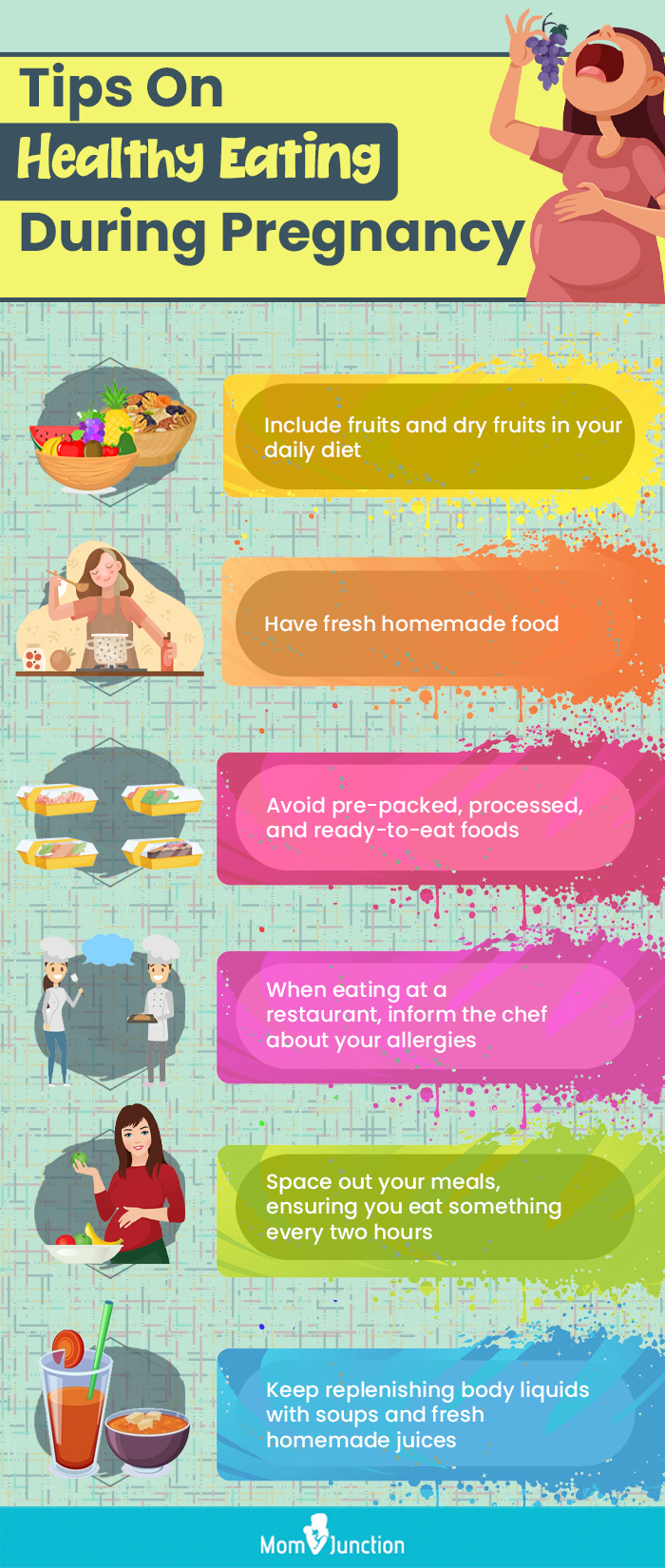
Key Pointers
- A pregnant woman should consume foods from all major food groups, including proteins, carbohydrates, fats, vitamins, minerals, and water, as part of a balanced diet.
- An Indian diet during pregnancy is rich in crucial nutrients for the mother and the unborn child.
- A pregnant woman can spread the meal plan throughout the day as pre-breakfast, breakfast, mid-morning snack, lunch, evening snack, and dinner.
- Eating the right foods in the correct quantity is essential throughout pregnancy.
- A healthy Indian pregnancy diet includes milk, dairy products, pulses, cereals, fruits, vegetables, meat, fish, and nuts.
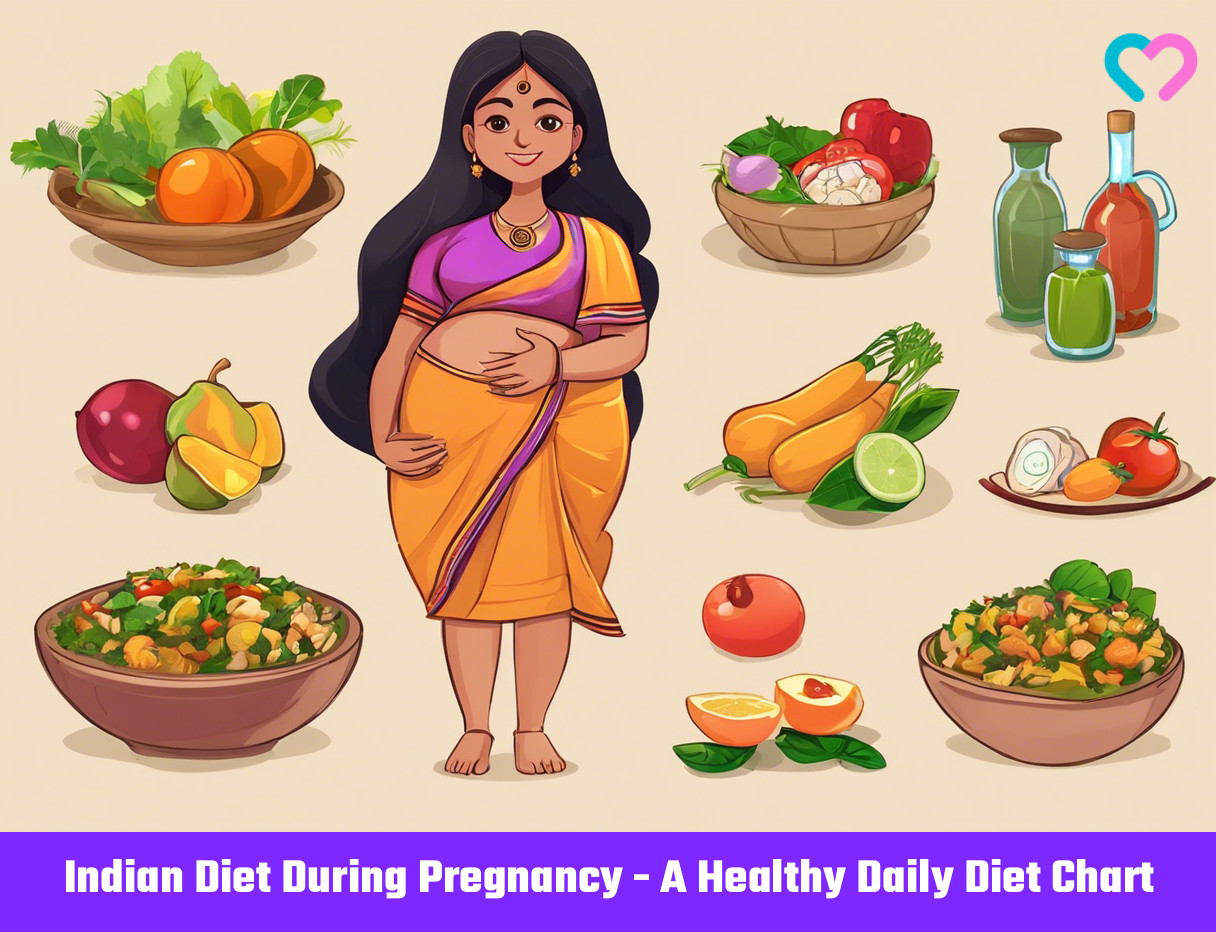
Image: Stable Diffusion/MomJunction Design Team
Personal Experience: Source
MomJunction articles include first-hand experiences to provide you with better insights through real-life narratives. Here are the sources of personal accounts referenced in this article.
i. Pregnancy sample diet chart 1 – south indian diet chart – food chart for pregnancy women.https://testblogaarthi.blogspot.com/2016/05/pregnancy-sample-diet-chart-1-south.html
References
- Dietary Guidelines for Indians.
https://www.nin.res.in/downloads/DietaryGuidelinesforNINwebsite.pdf - Spicing Up Your Life during Pregnancy and Breastfeeding: Are Spices and Herbs Ok?
https://mothertobaby.org/baby-blog/spicing-up-your-life-during-pregnancy-and-breastfeeding-are-spices-and-herbs-ok/ - Beata Sarecka-Hujar and Beata Szulc-Musioł; (2022); Herbal Medicines—Are They Effective and Safe during Pregnancy?
https://www.ncbi.nlm.nih.gov/pmc/articles/PMC8802657/ - Have a healthy diet in pregnancy
https://www.nhs.uk/pregnancy/keeping-well/have-a-healthy-diet/ - Kirti C Mishrikoti and Asha G; (2021); Food Safety Behaviour, Hygiene and Sanitary Practices of Street Food Vendors
https://www.ijhsr.org/IJHSR_Vol.11_Issue.1_Jan2021/IJHSR31.pdf





